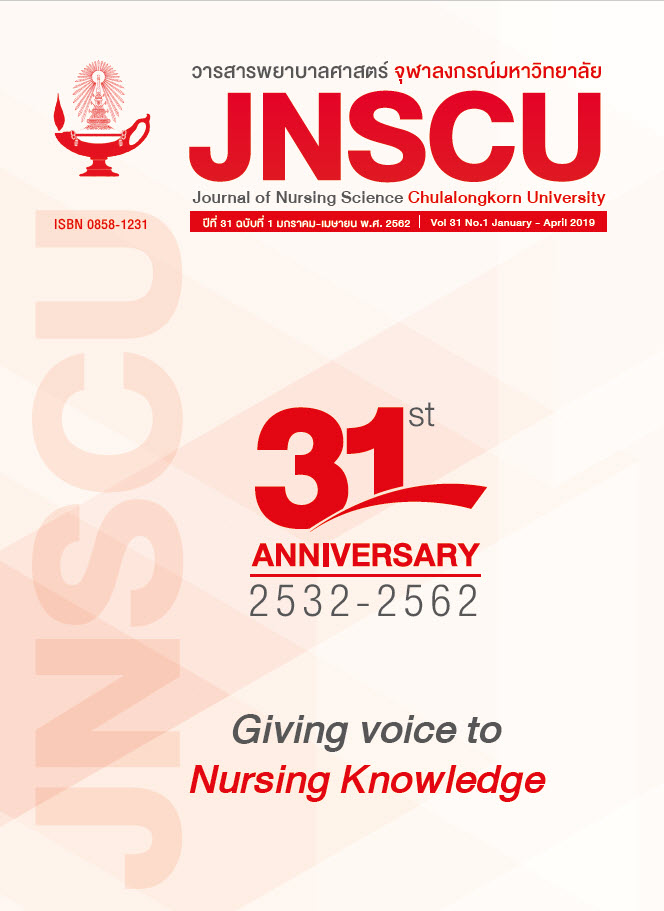ผลของการให้ความรู้ต่อการปฏิบัติตนก่อนการส่องกล้อง ลำไส้ใหญ่ ในบุคคลกลุ่มเสี่ยงโรคมะเร็งลำไส้ใหญ
คำสำคัญ:
การส่องกล้องลำไส้ใหญ่, การให้ความรู้, การปฏิบัติตนก่อนการส่องกล้องลำไส้ใหญ่บทคัดย่อ
วัตถุประสงค์: 1) ศึกษาการปฏิบัติตนก่อนการส่องกล้องลำไส้ใหญ่ในบุคคลกลุ่มเสี่ยงโรคมะเร็งลำไส้ใหญ่ที่ได้รับ
โปรแกรมการให้ความรู้ก่อนการส่องกล้องลำไส้ใหญ่ และ 2) เปรียบเทียบการปฏิบัติตนก่อนการส่องกล้องลำไส้ใหญ่
ในบุคคลกลุ่มเสี่ยงโรคมะเร็งลำไส้ใหญ่ระหว่างกลุ่มที่ได้รับโปรแกรมการให้ความรู้ก่อนการส่องกล้องลำไส้ใหญ่
และกลุ่มที่ได้รับการพยาบาลตามปกติ
รูปแบบการวิจัย: การวิจัยกึ่งทดลอง (Quasi-experimental design) แบบสองกลุ่มวัดผลหลังการทดลอง
วิธีดำเนินการวิจัย: กลุ่มตัวอย่างคือ บุคคลกลุ่มเสี่ยงโรคมะเร็งลำไส้ใหญ่อายุระหว่าง 18-59 ปี ที่เข้ารับการรักษา
ด้วยการส่องกล้องลำไส้ใหญ่ ที่ห้องส่องกล้องทางเดินอาหารโรงพยาบาลสุรินทร์ จำนวน 44 ราย จับคู่ด้วยเพศ อายุ
และระดับการศึกษา เข้าเป็นกลุ่มทดลองและกลุ่มควบคุมกลุ่มละ 22 คน กลุ่มทดลองได้รับโปรแกรมการให้ความรู้
ก่อนการส่องกล้องลำไส้ใหญ่ กลุ่มควบคุมได้รับการพยาบาลตามปกติ เครื่องมือทดลองคือ โปรแกรมการให้ความรู้
ตามแนวคิดของ Alice เก็บรวบรวมข้อมูลโดยใช้ 1) แบบบันทึกข้อมูลส่วนบุคคล 2) แบบวัดการปฏิบัติตนก่อนการ
ส่องกล้องลำไส้ใหญ่ ได้ค่าความเชื่อมั่น (KR-20) เท่ากับ .80 วิเคราะห์ข้อมูลด้วยสถิติเชิงพรรณนาและการทดสอบ
ค่า Mann-Whitney U test
ผลการวิจัย: 1) บุคคลกลุ่มเสี่ยงโรคมะเร็งลำไส้ใหญ่ที่ได้รับโปรแกรมการให้ความรู้ก่อนการส่องกล้องลำไส้ใหญ่
สามารถปฏิบัติตนภายหลังได้รับโปรแกรม มีจำนวน 2 ข้อ ที่ปฏิบัติได้น้อยที่สุดจำนวน 17 คน คิดเป็น ร้อยละ 77.3
และมีจำนวน 13 ข้อที่ปฏิบัติได้ 22 คน คิดเป็น ร้อยละ 100 และ 2) การปฏิบัติตนก่อนการส่องกล้องลำไส้ใหญ่
ในบุคคลกลุ่มเสี่ยงโรคมะเร็งลำไส้ใหญ่กลุ่มที่ได้รับโปรแกรมการให้ความรู้ก่อนการส่องกล้องลำไส้ใหญ่ มีการปฏิบัติตน
ดีกว่ากลุ่มที่ได้รับการพยาบาลตามปกติอย่างมีนัยสำคัญทางสถิติที่ระดับ .05
สรุป: โปรแกรมการให้ความรู้ก่อนการส่องกล้องลำไส้ใหญ่มีประสิทธิผลต่อการปฏิบัติตนก่อนส่องกล้องลำไส้ใหญ่
ในบุคคลกลุ่มเสี่ยงโรคมะเร็งลำไส้ใหญ่
เอกสารอ้างอิง
National Cancer Institute. Hospital-Base cancer registry 2018.Bangkok: National Cancer Institute Departmentof Medical Services Ministry of Public Health Thailand. 2018. (In Thai)
Guo X, Yang Z, ZhaoL, Leung F, Luo H, Kang X,etal.Enhanced instructions improve the quality of bowel preparation for colonoscopy: a meta-analysis of randomized controlled trials. Gastrointestinal endoscopy 2017;
(1):90-7.
Hassan C,BretthauerM,KaminskiMF,Polkowski M, Rembacken B, Saunders B, et al. Bowel preparation for colonoscopy: European Society of Gastrointestinal Endoscopy(ESGE)guideline.Endoscopy 2013;45(2):142-50.
Modi C, DePasquale JR, DiGiacomo WS, Malinowski JE, EngelhardtK, ShaikhSN, Baddoura WJ, et al. Impact of patient education on quality of bowel preparationinoutpatientcolonoscopies. Quality in Primary Care 2009;17(6):
-404.
RomeroRV, Mahadeva S. Factors influencing quality of bowel preparation for colonoscopy. World Journal of
Gastrointestinal Endoscopy 2013;5(2): 39-46.
Wexner SD, Beck DE, Baron TH, Fanelli RD, Hyman N, Shen B, et al. A consensus documenton bowel preparation before colonoscopy: prepared by a task force fromthe AmericanSocietyof Colonand Rectal Surgeons (ASCRS), the American Society for Gastrointestinal Endoscopy (ASGE), and the Society of American Gastrointestinaland EndoscopicSurgeons (SAGES).SurgicalEndoscopy And Other Interventional Techniques 2006;20(7): 1147-60.
McLachlan S-A, Clements A, Austoker J. Patients’ experiences and reported barriers tocolonoscopyinthescreening context—A systematic review of the literature. Patient Education and Counseling 2012;86(2):137-46.
Serper M, Gawron AJ, Smith SG, Pandit AA, Dahlke AR, Bojarski EA, et al. Patient factorsthataffect qualityofcolonoscopy preparation. Clinical Gastroenterology and Hepatology 2014;12(3):451-7.
BhanthumkomolP,SiramolpiwatS,Vilaichone RK. Incidence and predictors of inadequate bowel preparation before elective colonoscopy in Thai patients. AsianPacificJournalofCancerPrevention 2014;15(24):10763-8.
Liu X,Luo H, ZhangL,LeungFW,Liu Z,Wang X,etal.Telephone-based re-education onthe day beforecolonoscopyimproves the quality of bowel preparation and the polyp detectionrate:a prospective,
colonoscopist-blinded, randomised, controlled study. Gut2014;63(1):125-30.
WongtaweeS,BoonwiriyaS,Boonpipattanapong T, Sriwanayos K, Tongwong M. Comparison of efficacy between low residue diet in colonoscopic bowel preparation in surgical clinic. Songkla Med J 2016;34(2):61-70. (In Thai)
Sharara AI,ElReda ZD, Harb AH, AbouFadel CG, Sarkis FS, Chalhoub JM, et al. The burdenof bowel preparationsin patients undergoingelectivecolonoscopy.United European Gastroenterology Journal
;4(2):314-8.
LebwohlB,KastrinosF, Glick M,Rosenbaum AJ, Wang T, Neugut AI. The impact of suboptimal bowel preparation on adenoma miss rates and the factors associatedwithearlyrepeatcolonoscopy.
Gastrointestinal Endoscopy 2011;73(6): 1207-14.
Fisher DA, Maple JT, Ben-Menachem T, Cash BD, Decker GA, Early DS, et al. Complicationsofcolonoscopy.Gastrointest Endosc 2011;74(4):745-52.
Roopchang S. The Effectiveness of nursing informationonhealthoutcomesinadult patient with cancer: A meta-analysis [Master degree, Nursing science program]. Bangkok: Chulalongkorn University; 2007. (In Thai)
Lorenzo-ZunigaV, Moreno deVegaV, MarinI, Barbera M,BoixJ. Improvingthe quality of colonoscopy bowel preparation using a smart phone application: A randomized trial. Digestive Endoscopy 2015;27(5):590-5.
Alice MK. Teaching for Health. 3ed. China: Elsevier; 2004. 232 p.
Katseesung P, Asdornwised U, Pinyopaskul W. Effects of continuing care program on quality of bowel preparation and anxiety in who receiving ambulatory colonoscopy.Journalof NursingScience 2015; 33(3):61-73. (In Thai)
WongwanichS.,Wiratchai N.Thesis Guidance. Bankok: Chulalongkorn University press;2003. (In Thai)



